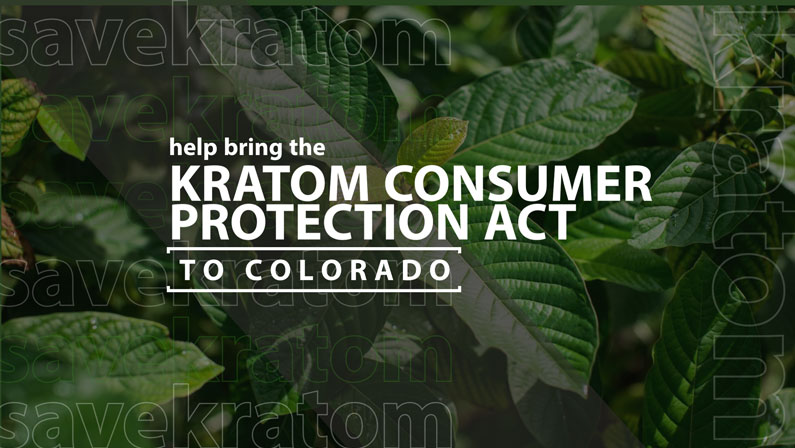The American Kratom Associated recently announced their plans to introduce a version of the so-called Kratom Consumer Protection Act in Colorado during the 2020 legislative session. More and more states, counties, and municipalities are beginning to enact restrictions and/or banning kratom outright. It’s up to us to bring the facts to our state legislatures. Lobbyists in Colorado are now working hard to put together a framework around kratom sales that will protect consumers from adulterated products. Arizona, Georgia, Nevada, and Utah have all passed similar versions – it’s time for Colorado to follow suit.
There’s plenty you can do to help the AKA protect kratom in Colorado. The first step is to follow their Facebook page to keep up to date on local events. Next, hop on over to speciosa.org and sign up for their newsletter list. They’ll keep you up to date on everything kratom related.
We’ve included the framework for the act below but you can find additional information on the AKA’s inside plan to bring the KCPA to Colorado on their website.
Kratom Consumer Protection Act
A bill to regulate the preparation, distribution, and sale of kratom products; to prohibit the preparation, distribution, and sale of adulterated or contaminated kratom products; to prescribe fines and penalties and allow remedies; and to provide for the powers and duties of certain state governmental officers and entities.
Sec. 1. This act shall be known and may be cited as the “Kratom Consumer Protection Act”.
Sec. 2. As used in this act:
(a) “Dealer” means a person that sells, prepares, or maintains kratom products, or advertises, represents, or holds itself out as selling, preparing, or maintaining kratom products. Dealer includes, but is not limited to, a manufacturer, wholesaler, store, restaurant, hotel, catering facility, camp, bakery, delicatessen, supermarket, grocery store, convenience store, nursing home, or food or drink company.
(b) “Department” means the department of [INSERT NAME OF STATE AGENCY OR DEPARTMENT] (c) “Director” means the director of the department or his or her designee.
(d) “Food” means a food, food product, food ingredient, dietary ingredient, dietary supplement, or beverage for human consumption.
(e) “Kratom product” means a food product or dietary ingredient containing any part of the leaf of the plant Mitragyna speciosa.
Sec. 3.
(1) A dealer that prepares, distributes, sells, or exposes for sale a food that is represented to be a kratom product shall disclose on the product label the factual basis upon which
that representation is made.
(2) A dealer shall not prepare, distribute, sell, or expose for sale a food represented to be a kratom product that does not conform to the disclosure required under subsection (1).
Sec. 4.
A dealer shall not prepare, distribute, sell, or expose for sale any of the following:
(a) A kratom product that is adulterated with a dangerous non-kratom substance. A kratom product is adulterated with a dangerous non-kratom substance if the kratom product is mixed or packed with a non-kratom substance and that substance affects the quality or strength of the kratom product to such a degree as to render the kratom product injurious to a consumer.
(b) A kratom product that is contaminated with a dangerous non-kratom substance. A kratom product is contaminated with a dangerous non-kratom substance if the kratom product contains a poisonous or otherwise deleterious non-kratom ingredient, including, but not limited to, the substances listed in section [INSERT THE RELEVANT LOCATION OF THE STATE’S CONTROLLED SUBSTANCES LIST].
(c) a kratom product containing a level of 7-hydroxymitragynine in the alkaloid fraction that is greater than 2% of the alkaloid composition of the product.
(d) a kratom product containing any synthetic alkaloids including synthetic mitragynine, synthetic 7-hydroxymitragynine, or any other synthetically derived compounds of the kratom plant.
(e) any kratom containing product that does not include on its package or label the amount of mitragynine and 7-hydroxymitragynine contained in the product.
Sec. 5. A dealer shall not distribute, sell, or expose for sale a kratom product to an individual under 18 years of age.
Sec. 6. (1) A dealer that violates section 3(1) is subject to an administrative fine of not more than $500.00 for the first offense and not more than $1,000.00 for the second or subsequent offense. Upon the request of a person to whom an administrative fine is issued, the director shall conduct a hearing in accordance with the [INSERT THE RELEVANT CODE SECTION].
(2) A dealer that violates section 3(2), (4), or (5) is guilty of a misdemeanor punishable by imprisonment for not more than 90 days or a fine of not more than $500.00, or both.
(3) A person aggrieved by a violation of section 3(2) or (4) may, in addition to, and distinct from any other remedy at law or equity, bring a private cause of action, in a competent court of jurisdiction, for damages resulting from that violation, including, but not limited to, economic, noneconomic, or consequential damages.
(4) A dealer does not violate section 3(2) or (4) if it is shown by a preponderance of the evidence that the dealer relied in good faith upon the representations of a manufacturer, processor, packer, or distributor of food represented to be a kratom product.
Sec. 7. The department shall promulgate rules for the administration and enforcement of this act under the [INSERT THE RELEVANT SECTION OF THE STATE CODE], including, but not limited to, the format, size, and placement of the disclosure label required under section 3(1) and the information that must be included in the disclosure.
Questions? Comments? Shoot us a note! We would love to share our knowledge about kratom!

